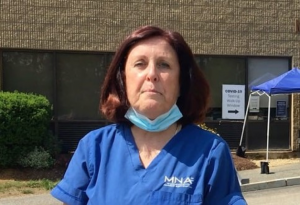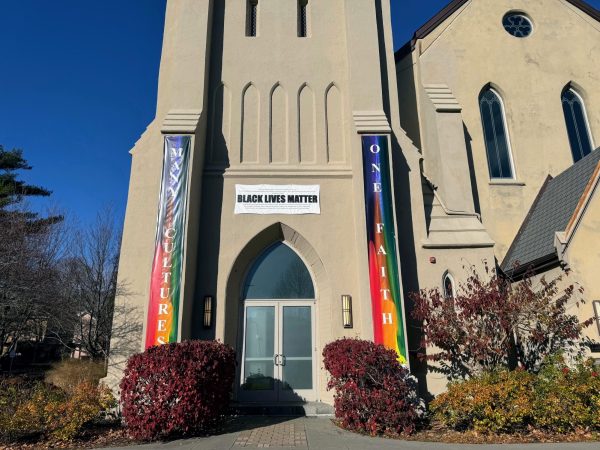Nurses call out lack of improvements to staffing, pay and benefits at three Cambridge Health Alliance hospitals
Hundreds of nurses represented by Massachusetts Nurses Association picketed outside Cambridge Health Alliance during National Nurses Week, on May 8 to call attention to a contract negotiation that excludes much-needed improvements to staffing, pay and benefits.
The contract being negotiated between Massachusetts Nurses Association (MNA) and Cambridge Health Alliance (CHA), according to Katie Murphy, a practicing ICU nurse based in Canton and the president of MNA, lacks a retroactively pay raise for experienced nurses, a recognition of unions for healthcare workers like pharmacy techs and occupational therapists or exemptions for charged nurses, those who have supervisory duties during their shift, from caring for patients while they oversee other nurses.
Not all healthcare professionals are able to enjoy all union-negotiated contractual provisions. Sharen Froilan, clinical leader and chair of the bargaining unit at the West 3 Everett hospital, said one of the most important proposals for the contract was to get all the non-nursing healthcare professionals to enjoy the same benefits granted to nurses. CHA is currently negotiating on this issue.
The contract negotiations were supposed to begin in January, 2019 over three separate MNA contracts for Cambridge, Everett, and Somerville but was delayed for about six months at the height of the pandemic so nurses could focus on saving lives.
Nurses are also calling attention to problems that have put even more strain on their work during the pandemic, such as staff shortages, inadequate protective equipment, working overtime to keep up with administering vaccines and above everything, risking their own lives to save others’.
“When they were calling us heroes during the pandemic, I was thinking talk is cheap, everyone can say anything,” said Murphy.
Understaffing is one of the biggest hurdles that nurses are facing in delivering quality care to patients. A staggering percentage of nurses report that lack of time with patients and high numbers of patients per nurse constitutes a major challenge.
The understaffing of nurses can lead to serious issues including patients accidentally getting themselves injured. “There are chances that they might slip when they go to the bathroom or slip while trying to get the oxygen up by themselves,” said Murphy.
When patients fall, it is reported to the Department of Public Health. However, Murphy said, “anecdotally there are hospitals that are discouraging nurses from reporting.”
The State of Nursing in Massachusetts, a randomized survey commissioned by the Massachusetts Rheumatology Nurses Society and conducted March 25 to March 30 by Boston-based Beacon Research, shows that the pandemic has exacerbated additional existing problems within the Massachusetts healthcare system, including mental health boarding in emergency departments, nurse burnout and turnover, and a lack of support for healthcare staff from employers.
Lisa Valley Shah has been working for CHA for about 38 years now and serves as the chair of a bargaining unit at Somerville hospital. The emergency unit she used to work at was converted to an urgent care facility due to the consequences of the pandemic. As a result, patients with life threatening problems were not able to go there anymore. According to Valley Shah, closing the emergency unit affected the most vulnerable and emotionally unstable patients.
“[Due to this change] many nurses lost their jobs. It was emotionally disturbing for those of us that had worked all our lives in that area when it closed [abruptly] and we basically had to start all over again,” said Valley Shah.
Even before the pandemic, emergency departments across the state were already overloaded with patients with mental health issues waiting for beds. In a 2018 state study, 155 mental health patients waited at least 96 hours in emergency departments over four months. Half of these patients were children.
The MNA has proposed addressing this problem in multiple ways. One bill they are proposing to Mass. Legislature would create a pilot program at Taunton State Hospital to transfer medically stable, high acuity behavioral health and dual diagnosis patients away from overcrowded emergency departments until an appropriate placement for treatment becomes available.
Murphy said that the corporatized healthcare system was woefully unprepared for a healthcare crisis. As a president of MNA and representing the union, she believes hospitals should be fiscally sound, but they must make sure that they have resources at the bedside.
“St Vincent Hospital took $3 billion from government last year in CARES act. [They] used it to pay down their debt. We believe that’s taxpayer dollars money, that’s your money, that’s my money, we believe it should be at the bedside too,” expressed Murphy.
A final point of contention is CHA’s shift from paid time off (PTO) to earned time system. PTO hours cover everything from planned vacations to sick days. Under the previous system, time off increased by one week after 5 and 15 years of tenure. Under the new system, the increase will occur after 10 and 20 years, thus penalizing nurses that have 5-9 and 15-19 years of experience, who had already accrued additional time off under the old system.
Cambridge hospital nurses will especially suffer the losses occasioned by the new earned time system. “That’s not acceptable but we are very close to an agreement [with CHA],” said Suzy Dailey, clinical leader at Windsor Healthcare Center and chair of bargaining unit at Cambridge Hospital.











